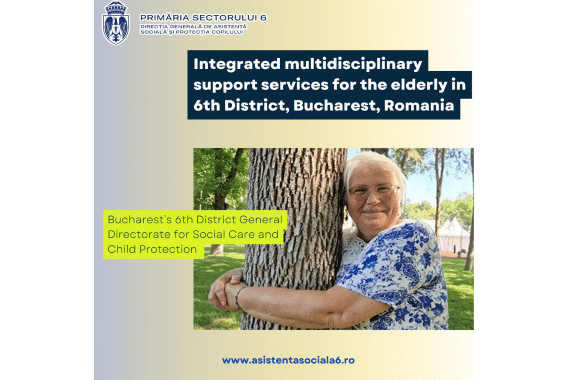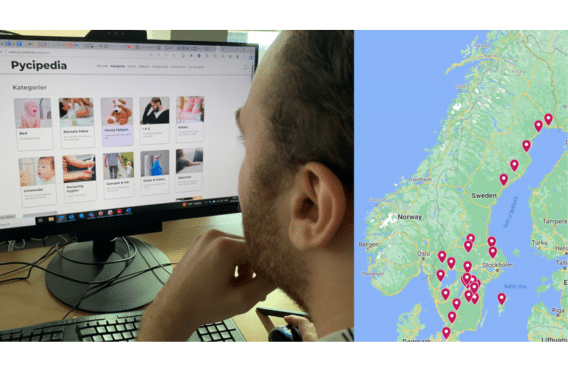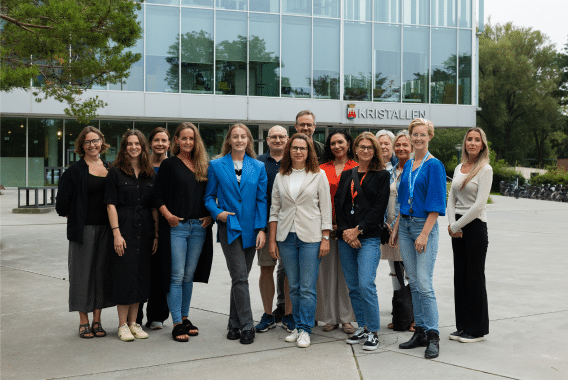Many of the social, environmental and economic challenges facing us today are exacerbated in cities, which are under pressure to respond to the diverse set of needs that arise as a result. With this headline award, ESN seeks to highlight the city that has been outstanding in Promoting Person-centred Care ensuring all their inhabitants’ rights, choices and independence are valued and respected.
The Excellence in Cities Award will be awarded to a project chosen from all the entries submitted by cities in each of the other categories.

The Social Atelier was established through an ongoing successful collaboration between the City of Osijek and DKolektiv – organisation for social development. It tackles the growing divide and polarisation (social, political, generational, sectoral) and lack of dialogue within communities. By fostering dialogue, empowering disadvantaged, underrepresented, vulnerable and marginalised groups and promoting interdisciplinary problem-solving, it aims to create a more inclusive society. This community centre provides a platform for individuals to voice concerns, share experiences, and actively shape their futures, fostering positive social change through empowerment, collaboration, and evidence-based community work. Noteworthy achievements include the organisation of over 200 community activities, which actively involved the participation of more than 600 individuals, resulting in over 3,000 visits to the community centre.
Integrated Multidisciplinary Support for Older People
Organisation: Bucharest 6th District General Directorate for Social Care and Child Protection
Country: Romania
Website: https://www.protectiacopilului6.ro/

Romania faces a significant demographic challenge with its rapidly ageing population and the need to ensure their autonomy. This project at Bucharest’s 6th District aims to enable older people’s active, independent lives while providing essential support by adopting a comprehensive person-centred approach. The project places a strong emphasis on improving communication and simplifying access to essential social services. It also strives to enhance the independence of older adults, ensuring they have a seamless continuum of respectful home care services while they may also access high quality residential care if needed. The impact of the initiative is evident in improved communication with 192 older persons, 500 participants in the awareness programme ‘Movement for Health’, 47 benefiting from home care services, 194 accessing vital medical care, and 37 receiving therapy services.
Person-Centred Telecare Service
Organisation: Madrid City Council
Country: Spain
Website: https://www.madrid.es/portales/munimadrid/es/Inicio/El-Ayuntamiento/
This project develops the telecare service in Madrid, from a reactive to a predictive and preventive service, which anticipates emergencies and promotes personalised care. The project puts the person at the centre of the service, making them a participant in the entire process. To achieve this, the service underwent a digital transformation, which included the introduction of technological devices that allow people to connect with the Service Centre directly from home, video calling to ensure personalised care, and the installation of detectors (e.g., for falls, smoke, gas/carbon). In 2022, the service was offered to 140,547 people, 1,014,231 calls were answered and there were 105,002 home trips. Calls are answered in less than 1 minute and the service has been evaluated with an excellent score by its users.

Sharing Improves Lives
Organisation: City Council of Churriana de la Vega
Country: Spain
Website: https://churrianadelavega.org/

The Department of Social Services in Churriana de la Vega is combating social isolation of older people and people with disabilities by offering various cultural, social, educational, and healthcare resources to enhance the integration of these individuals into society. Multidisciplinary teams, comprising social workers, psychologists, social educators, therapists, collaborate with local associations to identify and address the unique needs of each supported individual. This includes organising activities such as dance, tai chi, yoga, memory exercises, language courses, and outings, creating an inclusive and intergenerational environment. In addition, a home-sharing programme between participants helps combat loneliness and reduce the cost of housing. By providing support and companionship, the project helps individuals lead more satisfying and independent lives, promoting active ageing and overall well-being.
Social Care Transformation
Organisation: Aberdeen City Council
Country: United Kingdom
Website: https://www.aberdeencity.gov.uk/
Aberdeen City Council underwent a comprehensive digital transformation of their care services, introducing a new case management system to streamline processes across the organisation and establish a unified perspective on individual citizens. These digital records accompany citizens across their entire lifetime, and authorised partner agencies can securely access data, moving towards a cohesive ‘chronology’ of information. Social care teams can utilise the system remotely, also in client homes, facilitating assessments, and improving overall efficiency. The new system was co-created with practitioners to improve uptake, productivity, and efficiency for citizens. Notably, across all services, a substantial time-saving of 218 minutes per case was achieved, releasing a significant 1.7% of capacity in a previously under-resourced service.

BRUS: A Collaboration to Support Children and Youth at Risk
Organisation: The BRUS Partnership – The Cities of Aarhus, Randers, Herning, Hedensted, Skanderborg, Ikast-Brande, Norddjurs, Samsoe, Syddjurs, Skive, Odder, and Centre for Digital Youth Care
Country: Denmark
Website: https://ungbrus.dk/
BRUS offers support to children and young people growing up in families with alcohol or drug problems by providing counselling centred around their specific needs, goals, and preferences. The partnership brings together 11 municipalities and the NGO, Centre for Digital Youth Care, and engages a broad variety of professional stakeholders from the public sector, as well as volunteers who can provide person-centred and multifaceted support. The children and young people can benefit from a variety of face-to-face sessions and anonymous digital counselling, which is particularly useful for those who find it difficult to reach out for help. BRUS has reached over 2,800 children and youth through the face-to-face sessions and has had more than 1,600 visitors for digital counselling.

PYCIPEDIA: Knowledge Sharing Platform to Connect Specialist Social Workers
Organisation: Linköping Municipality
Country: Sweden
Website 1: https://blogit.itu.dk/codesigngroup/
Website 2: https://www.linkoping.se/language/

In Sweden, many municipalities have only one or two social workers trained in supporting parents with intellectual disabilities in their parenting role using the Parenting Young Children methodology. However, each social worker was working rather independently and there was limited peer support, sharing of best practice, and easy access to specialist training materials. To better support the social workers the wiki-type collaborative platform PYCIPEDIA was developed allowing social workers across Sweden to connect, and to create, browse, edit, and share training materials with each other and directly with parents. The platform has almost 100 registered social workers from 26 municipalities who engage in content development and online sharing. They have provided positive feedback on how they use the materials created and uploaded by other social workers, and how they are learning and being inspired by each other.
FACT – an Ecosystem of Care for People with Extensive and Changing Needs
Organisation: Lund Municipality
Country: Sweden
Website: https://lund.se/
Individuals with severe psychiatric difficulties often receive fragmented support from health and social care services. To ensure care continuity, comprehensiveness, and participation in the supply of care, Flexible Assertive Community Treatment (FACT) was introduced to deliver care and interventions in an integrated manner within health and social care services in several Swedish municipalities. FACT is a work model that allows the psychiatric team to organise care and support efforts in a flexible and individual- centred way. It also encourages collaboration between the patient and important partners such as relatives, social services and other care agencies. By involving all parties and by allowing the patient’s needs to control the intensity of support efforts, the patient can be a co-creator of their own care. All 8 municipalities involved in the project have now received formal training in FACT.

Community Engagement in Supporting Ukrainian Refugees
Organisation: City of Warsaw
Country: Poland
Website: https://en.um.warszawa.pl/

The arrival of Ukrainian refugees posed an immense social challenge for the City of Warsaw, demanding the coordination of different forms of assistance and the delivery of comprehensive, specialist, and individualised support. The City of Warsaw has risen to meet these challenges through the remarkable engagement of its society and NGOs, enabling the city to implement swift, professionally executed, and accessible aid programmes tailored to individual needs. The approach carefully balances the capacities of local hosts with refugees’ requirements. The outcomes are remarkable, with 57,000 working-age individuals registered three months after the conflict, reduced to 1,179 by April 2023, and over 35% of them securing employment, illustrating the positive impact of the city’s concerted efforts in addressing this complex social issue.
Dementia Friendly Helsingborg
Organisation: City of Helsingborg
Country: Sweden
Website: https://helsingborg.se/
By collaboratively creating dementia-friendly public spaces in partnership with older people, the City of Helsingborg aims to establish not only welcoming and safe environments for them, but also places that are intuitively navigable and rich in sensory experiences. Most importantly, through this initiative, the City enables the individual to independently access and take part in outdoor environments, securing health benefits, and to continue to engage with their communities.

Health Care Academy
Organisation: City of Mölndal
Country: Sweden

With a backdrop of a growing elderly population, large-scale retirements, and recruitment challenges in the City of Mölndal, this project aims to address the supply of skills in the health and social care administration, targeting both staff and managers. The Health Care Academy serves as a digital platform where employees can access a wide range of information, courses, and trainings on various topics related to the care profession.
The project promotes person-centred care by offering a comprehensive digital induction to workers, enhancing their knowledge in all aspects of the care profession. This, in turn, increases staff and manager confidence and enables better-individualised care for beneficiaries. More than 1,500 courses and training sessions have been completed as of June 2023. Results indicate there is an increased knowledge among staff and managers and improved conditions for delivering quality care to users. The implementation of digital induction ensures consistent information delivery to all staff and managers, regardless of time or location, simplifies document signing, and reduces administrative workload for managers.
